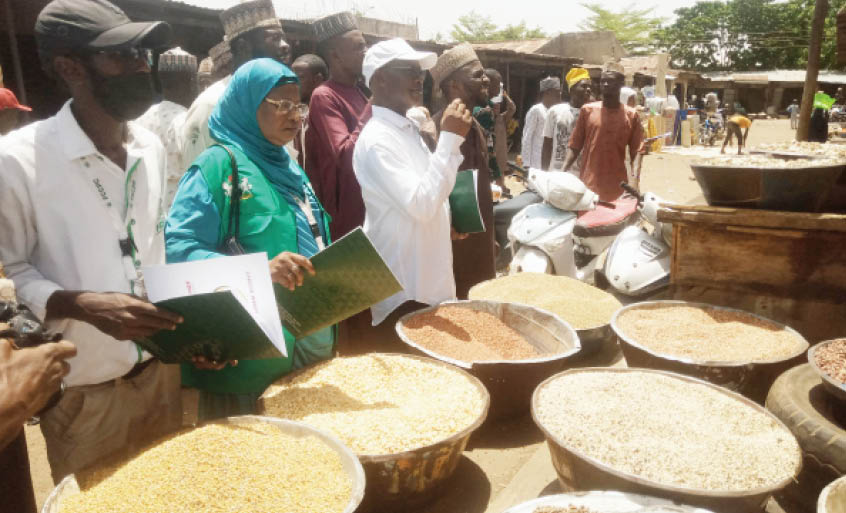Livestock feed producers mop up grains in Bauchi markets – Traders
Grains traders at the Muda Lawal market in Bauchi have disclosed that manufacturers of livestock feed and agents of rice companies, as well as major dealers hoarding the commodities are currently mopping up grains from village markets and were responsible for the continues hike in food prices in the state. The traders disclosed this Thursday […]

fcpcc officials having conversation with traders in bauchi
Grains traders at the Muda Lawal market in Bauchi have disclosed that manufacturers of livestock feed and agents of rice companies, as well as major dealers hoarding the commodities are currently mopping up grains from village markets and were responsible for the continues hike in food prices in the state.
The traders disclosed this Thursday during an interaction with the Federal Competition and Consumer Protection Commission (FCCPC) that conducted market’s survey with traders and traders’ associations and marketers to ascertain the factors responsible for the continuous hike in food prices in Bauchi.
Chairman of the grain traders in Bauchi State, Alhaji Nasiru Adamu, while responding to questions from officials of FCCPC and journalists, said, “The major reason for scarcity of grains in Bauchi is the influx of manufacturers of livestock feed buying grains, groundnuts and soybeans at exorbitant prices from farmers. As I am talking to you, there are dozens of companies from Kano and Lagos that have stormed village markets, mopping up rice, soybeans and groundnuts.”
Adamu explained, “Their prices are even higher than what we sell here in Bauchi town. When you buy a trailer load of maize, it will take you more than a month to sell to retailers in the market but the companies are ready to buy 10 or more trailers of grains at higher prices.”
Adamu further revealed, “Right now, many grain traders in Bauchi town have relocated to Azare and Katagum because irrigation farmers have harvested their crops and the traders are buying the grains from farmers and supplying the grains to the companies in Kano and Lagos states.”
Adamu said, “Although the farmers are increasing their prices but some of the challenges is the activities of major dealers who buy the commodity and hoard them in stores. Another cause of hikes in price is the fluctuations of fuel prices, prevalence of various taxes from unions and government across states. Just last week, we bought maize from the store of one of the major dealers at N51,000 per bag but this week, a bag costs N65,000.”
“We are suggesting to the FCCPC and state government to come up with a major market to check the inflow and outflow of commodities in the state. The proposed market should be the only avenue where such companies or major dealers hoarding the commodities can buy,” Adamu added
Chairman of Muda Lawal market, Mikail Abubakar Garba, who corroborated his colleague, said “Another area of concern is the export of grains and other commodities from Nigeria to foreign countries. We are not food sufficient enough for the citizens of the country, so government should ban exporting food items produced in Nigeria until the country is able to produce excess food.
Another grain trader at the Muda Lawal market, Usman Musa, maintained that the hike in prices of grains is as a result of hoarders in the market and the high demand of the commodities at the end of the month, adding, “many families buy food stuff on monthly basis and that is why the hike of prices of food items increases at the end of the month in Bauchi.”
On his part, the North East Zonal Coordinator of FCPCC, Dauda Amadu Waja, said FCCPC officials visited Muda Lawal market and Railway market in the metropolis to gather information directly from the sources and stakeholders in the markets particularly executives, market unions, sellers and consumers.
He explained that, “FCCPC’s surveillance efforts suggest that participants in the food chain and distribution sector, including wholesalers and retailers, are allegedly engaged in conspiracy, price gauging, hoarding and other unfair tactics to restrict or distort competition in the market, restrict the supply of food, manipulate and inflate the price of food in an indiscriminate manner. These obnoxious, unscrupulous, exploitative practices are illegal under the FCCPA.”
Waja further disclosed “Following this exercise, the Commission would develop a concise report of its inquiry and make recommendation to the government in accordance with Section 17(b) of the FCCPA and initiate broad based policies and review economic activities in Nigeria to identify and address anti-competitive, anti-consumer protection and restrictive practices to make markets more competitive while also ensuring fair pricing for consumers.”
He noted that the commission’s priority remains to unlock the markets and address key consumer protection and competition issues affecting the prices of commodities in the food sector.
